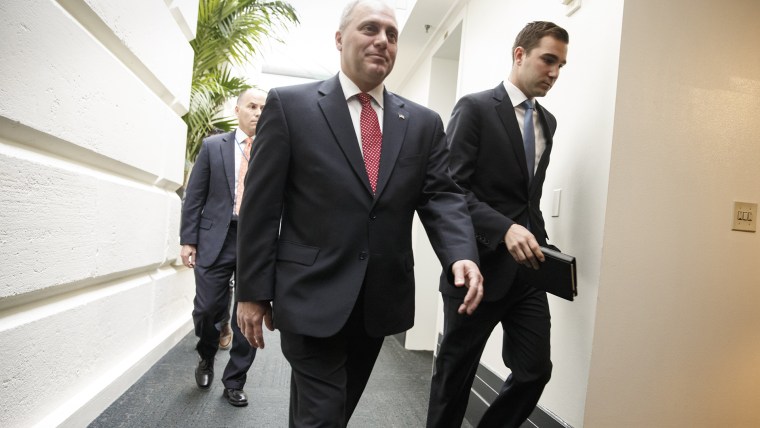A week ago, House Majority Whip Steve Scalise (R-La.) was found to have spoken at a white-supremacist event and his career was in jeopardy. A week later, Scalise's fate is secure -- he'll not only keep his seat, but the far-right Louisianan won't even face a challenger for his leadership post.
Dave Weigel
talked to some of the congressman's colleagues, one of whom is inclined to blame news organizations for the whole mess.
"He's a friend of mine, and I've never known anything about Steve that suggested views of that sort," said Representative John Fleming of Louisiana. "It was distant in the past." "I think the media moves too fast on a lot of things, whether it's that or it's racial tension in Ferguson," said South Carolina Representative Jeff Duncan. "Everyone's trying to scoop everyone else, and with the 24-hour news cycle, whoever gets the 'scoop' gets the most views. That was what happened with 'hands up, don't shoot.' They took an eyewitness account, and it turned out not to be from an eyewitness."
I'm not even going to try to decipher what Jeff Duncan is trying to say, though the notion that journalists weren't supposed to be interested in a House GOP leader talking to a white-supremacist group seems bizarre, even for him.
Regardless, what congressmen like Fleming and Duncan are willing to say on the record is hardly a surprise -- exactly zero Republican lawmakers publicly criticized Scalise and/or called for him to step down from his leadership post.
But is there a difference between this and what members are willing to quietly acknowledge off the record?
As
Rachel noted on the show last night,
Politico reportedly spoke to "multiple aides and lawmakers" recently, many of whom acknowledged that Scalise "faces serious questions over his political future."
Scalise's job as House majority whip remains safe -- and Speaker John Boehner has publicly backed him -- but he may be too toxic for some Republican circles. Top GOP aides and lawmakers question whether he'll be able to raise funds, especially on trips to New York or Los Angeles. Senior figures within the party doubt that the corporate chieftains and rich donors who bankroll Republican candidates will give him money to keep campaign coffers filled. Others say it will be difficult for him to persuade lawmakers to support the House Republican agenda.
It's worth emphasizing that none of Scalise's GOP critics were willing to identify themselves or speak on the record -- a courtesy House Speaker John Boehner probably envies.
Nevertheless, in the larger context, there are some stories that are very difficult to live down. Scalise, who's had an otherwise unremarkable congressional career, may stick around for a while, but going forward, expect most of the political world to ask, whenever his name comes up, "Isn't he the guy who talked to a white-supremacist group, after being invited by an aide to a neo-Nazi?"
